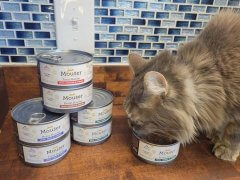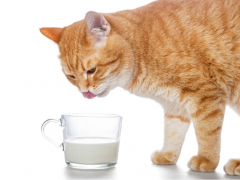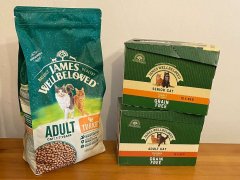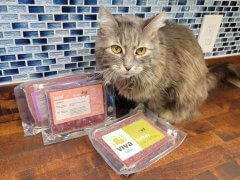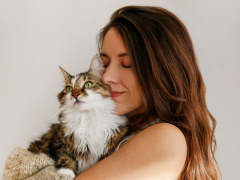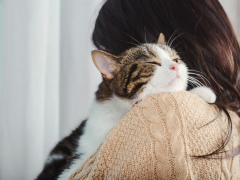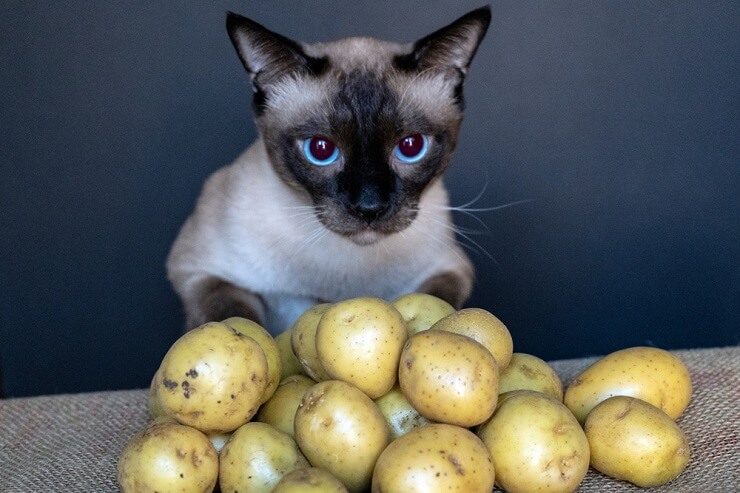
Potatoes are one of the world’s most versatile and abundant root vegetables. They originated in South America but were brought to Europe in the 16th century. Since then, they have become a staple part of our diet, and there are hundreds of varieties with individual shapes, textures and flavors.
While you’re busy roasting or mashing some potatoes, you might be wondering whether they are safe for cats. There is no straight answer; however, cooked potatoes are nontoxic and safe for cats in small quantities.
Cats can eat plain, cooked potatoes in small amounts, but they offer little nutritional value and should not be a significant part of their diet.Quick Overview: Can Cats Eat Potatoes?





Summary of Content
Raw potatoes are poisonous to cats, just like they are to people. Although potatoes offer great nutritional value to humans, they don’t offer much to cats. Let’s have a look at when potatoes are safe for your feline friend, and which types of potatoes to avoid!
Are Potatoes Good for Cats?
Potatoes are rich in carbohydrates, protein and fiber, as well as vitamins, minerals and antioxidants. However, they don’t really have much nutritional benefit to cats.
Potatoes are a useful ingredient in commercially prepared cat foods to add taste and texture. But cats are obligate carnivores, meaning they must consume meat and fish to stay healthy, and this is where they get most of their nutrition.
A small amount of cooked potato cut into small pieces or mashed can be a tasty treat for cats and is certainly not an unhealthy snack. However, there are other healthier and more nutritionally balanced treats to offer to your cat.
Do Cats Like the Taste of Potato?
Cats often enjoy the taste of human food, and some cats will do anything to get their paws on some! Potato cooked plain has little flavor or appeal to cats, however, sweet potato is tastier. Cats prefer the taste of potato when it is mixed with other ingredients, such as meat or fish.
How Much Potato Can a Cat Eat?
A small amount of potato is okay for cats, so if your feline friend gets their paws on a few pieces, you don’t need to worry.
Potato is something that should be kept to a very occasional treat though, as too much could give your cat an upset tummy or contribute to weight gain. A small teaspoon of mashed potato or a few small pieces of cooked plain potatoes is plenty.
How Often Can a Cat Eat Potatoes?
Potato should not appear too regularly in your cat’s diet. A small amount of plain cooked potato chopped into very small pieces or a small teaspoon of mashed potato is okay, but this shouldn’t be more than once a week.
Are Potatoes Used in Commercial Cat Food?
Potato is a common ingredient in many wet and dry cat foods. Potatoes are a great filler ingredient to add taste and texture, as well as an added source of protein and complex carbohydrates. Potatoes and carrots or peas are common combinations of veggies in cat foods. Potato starch (a carbohydrate derived from potatoes) is often used as a binding agent or thickener in cat food
Are Potatoes Bad for Cats?
Cats are obligate carnivores, so they need to consume meat to stay healthy. This means that potatoes shouldn’t be added too heavily in their diet, as they don’t actually add very much nutritional value. But potatoes can also be dangerous to cats in other ways.
Can Cats Eat Raw Potatoes?
Raw potato is poisonous to cats, just like humans, because it contains a compound called solanine. If eaten, raw potatoes can cause vomiting and diarrhea, as well as lethargy and disorientation. Raw potatoes could also be a choking hazard to cats.
Potatoes that have been cooked in oil, butter or fat can also make cats sick. The oils and fats are hard to digest and can cause vomiting and diarrhea if cats eat them. But they can also trigger a condition called pancreatitis (inflammation of the pancreas), which can cause more severe gastrointestinal symptoms. Other ingredients in cooked potatoes could also be dangerous to cats.
Cats can’t tolerate as much salt as humans, and salty food can make them dehydrated very quickly. It’s best to prevent your cat from eating potato salads, potato chips, fried potatoes, or potatoes and gravy.
Final Thoughts
Potatoes can be a great way to add carbs and fiber to commercially prepared cat foods, and if your cat eats a little piece of cooked or mashed potato every so often you certainly don’t need to worry.
However, potatoes don’t offer much nutritional value to cats. Raw potatoes are poisonous to cats, and potatoes cooked in oils, fats or flavoring can also cause an upset tummy. A very small amount of potato is unlikely to cause your pet any harm, but potatoes should not appear regularly in your cat’s diet.
Frequently Asked Questions
Is it safe for cats to eat potatoes?
Yes, it is safe for cats to eat plain cooked potatoes in very small and infrequent quantities.
Why are potatoes bad for cats?
Raw potatoes contain a compound called solanine, which is toxic to cats, humans and other animals. It can cause vomiting, diarrhea, lethargy and disorientation. Potatoes cooked in oils, fats or flavorings can also give cats an upset tummy or could be toxic. Potatoes don’t offer cats much nutritional value, and they get most of their nutrition from meat and fish.
What food is toxic to cats?
Onion, garlic, chocolate, alcohol, caffeine, grapes and raisins are all toxic to cats. If you think your cat has eaten even a small amount of any of these foods, you should contact your vet straight away.
